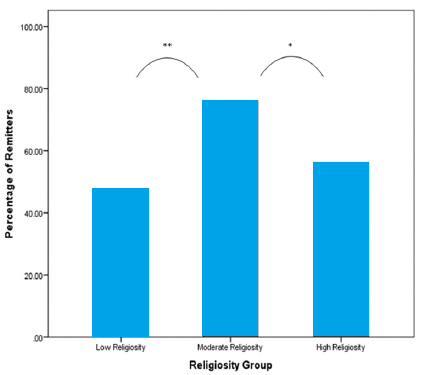Patients who participate in medical trials are rarely asked about their religious beliefs, so we should be grateful for any studies that do. Here’s one, and it’s a study of citalopram (sold as Cilexa and Cipromil), which is a modern antidepressant – a bit like Prozac.
So they got religion info on 148 patients out of the 300-odd who took part in the trial (they were a slightly unusual bunch – 64% black, 64% women, and 79% single). And they asked them about their ‘Religious well-being’ (i.e. whether they thought that God loves them) and about how often they went to Church.
Then they checked up on how many patients had a remission of their depression after treatment. Unsurprisingly, there was no correlation at all between either measure of religiosity and their response (or lack of response).
But then they dug a bit further, splitting the group into three according to Church attendance (low, medium or high). Now they found something – people in the middle of the range had a better response than low or high frequency Church-goers.
What to make of this? Well, the authors speculate that frequent Church-goers might not take their medicine, or that highly depressed people might go to Church more often.
This doesn’t explain the low response among infrequent churchgoers, however, and it’s tempting to look for some kind of link to other research which shows that people at low and high levels of religiousness tend to be happier than those in the middle (see: the Happiness Smile).
But, to be honest, you do have to take these results with a pinch of salt. There are a number of problems with this study. First of, the cardinal rule of statistics is not to going digging around in the numbers if you don’t find what you’re looking for first time round. The reason is that the laws of chance means that you’re bound to find some kind of pattern eventually – but it will probably be a mirage.
Indeed, a previous study found that religious well-being was linked to better response to antidepressants, in contradiction to this one. Just goes to show that you can’t put too much store on these small, ad-hoc studies.
And lastly, there was no placebo control in this trial. That means we don’t know if what we’re seeing is a genuine effect of the medicine, or simply nature taking it’s course.
Perhaps it’s simply that people who do normal things, which in the USA (especially the Black community) means things like going to Church regularly but not obsessively, are more likely to recover from depression!
Schettino, J., Olmos, N., Myers, H., Joseph, N., Poland, R., & Lesser, I. (2011). Religiosity and treatment response to antidepressant medication: a prospective multi-site clinical trial Mental Health, Religion & Culture, 1-14 DOI: 10.1080/13674676.2010.527931
 This article by Tom Rees was first published on Epiphenom. It is licensed under Creative Commons.
This article by Tom Rees was first published on Epiphenom. It is licensed under Creative Commons.














